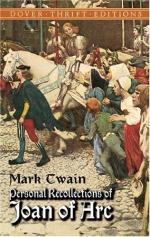“Now, where have you dropped down from? And how did you happen to light in this place? And what do the soldier-clothes mean? Tell me all about it.”
He answered:
“I marched with you last night.”
“No!” (To myself I said, “The prophecy has not all failed—half of it has come true.”) “Yes, I did. I hurried up from Domremy to join, and was within a half a minute of being too late. In fact, I was too late, but I begged so hard that the governor was touched by my brave devotion to my country’s cause—those are the words he used—and so he yielded, and allowed me to come.”
I thought to myself, this is a lie, he is one of those six the governor recruited by force at the last moment; I know it, for Joan’s prophecy said he would join at the eleventh hour, but not by his own desire. Then I said aloud:
“I am glad you came; it is a noble cause, and one should not sit at home in times like these.”
“Sit at home! I could no more do it than the thunderstone could stay hid in the clouds when the storm calls it.”
“That is the right talk. It sounds like you.”
That pleased him.
“I’m glad you know me. Some don’t. But they will, presently. They will know me well enough before I get done with this war.”
“That is what I think. I believe that wherever danger confronts you you will make yourself conspicuous.”
He was charmed with this speech, and it swelled him up like a bladder. He said:
“If I know myself—and I think I do—my performances in this campaign will give you occasion more than once to remember those words.”
“I were a fool to doubt it. That I know.”
“I shall not be at my best, being but a common soldier; still, the country will hear of me. If I were where I belong; if I were in the place of La Hire, or Saintrailles, or the Bastard of Orleans—well, I say nothing. I am not of the talking kind, like Noel Rainguesson and his sort, I thank God. But it will be something, I take it—a novelty in this world, I should say—to raise the fame of a private soldier above theirs, and extinguish the glory of their names with its shadow.”




